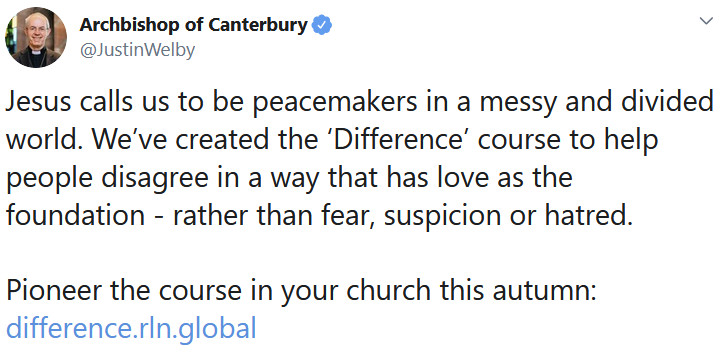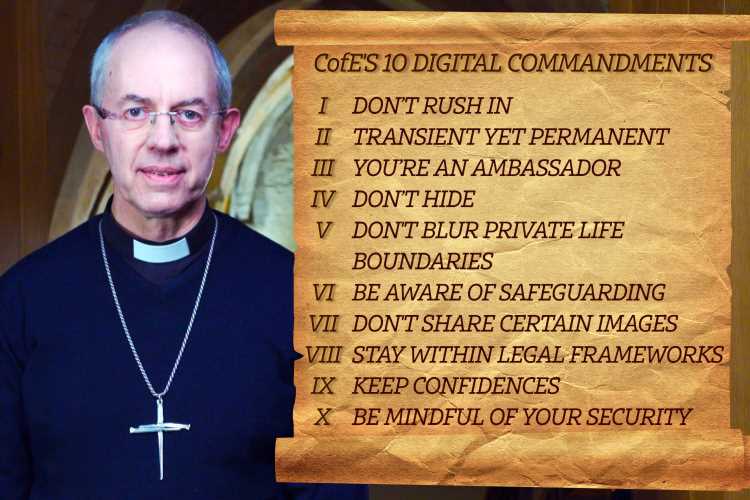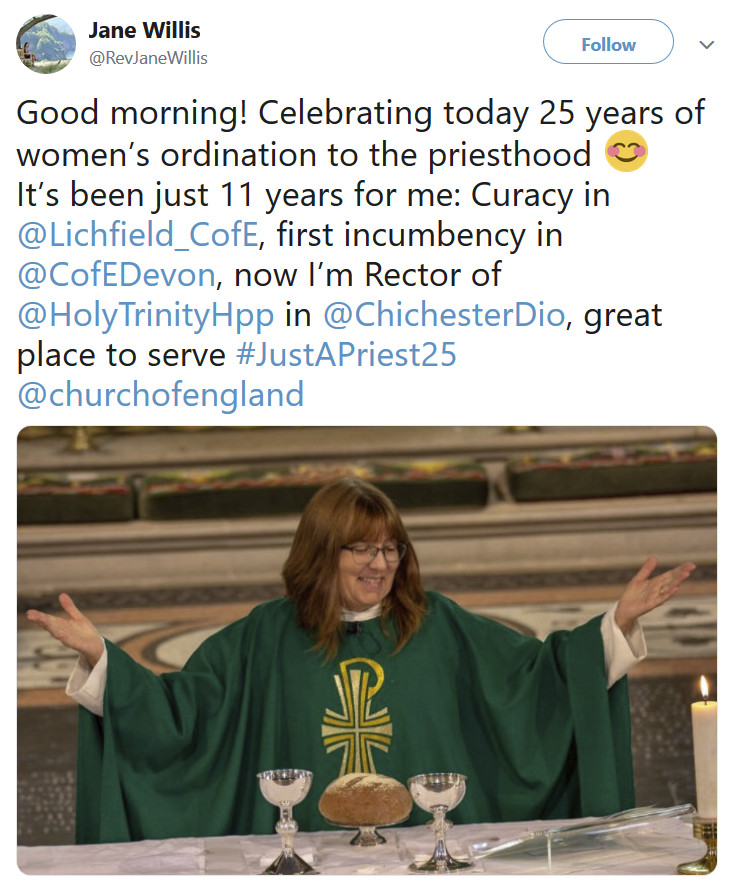She is correct.
The solution is to populate the church of England with clergy from Nigeria, Rwanda and Uganda. Not only are they black but they have the side benefit of being Christians.

She is correct.
The solution is to populate the church of England with clergy from Nigeria, Rwanda and Uganda. Not only are they black but they have the side benefit of being Christians.
The Nicene Creed has it wrong. Rather than:
For us men and for our salvation
he came down from heaven
It should say:
For us men and to rebuild our relationship with the planet
he came down from heaven
Because, you see, being reconciled with the planet is more important than being reconciled with God the Father. If you worship Gaia, that is.
From here:
Church of England’s first ever green Lent campaign launches
Launching the resources, Archbishop Justin Welby said: “We urgently need to rebuild our relationship with our planet. To do this, we need to change our habits – in how we pray and how we act.“Lent is not just about discipline. It’s about allowing Christ to show us what’s keeping us from loving and serving Him – and joyfully letting it go.
“Whatever age you are, this Lent I hope you’ll engage with God’s plea for us to care for His creation, and that these campaign resources will help you on that journey.”
Just some of the questions posed during the series are:
‘How much water goes into making a pair of jeans?’
‘Could you twin your toilet?’
‘When was the last time you gazed at the night sky?’
‘What was the carbon footprint of the meal I just ate?’
If you don’t have a relationship with the planet – I must admit, I don’t – then pull yourself together, twin your toilet, feel guilty about the carbon footprint of your dinner and google how much water was used in making your trousers. That should do it.
And bishops wonder why people are leaving the church of England.
Sorry, I see I used “men” above. I meant “members of the non-binary, gender fluid, LGBT+, androgynous community; (aka a CofE vicar).”
The Church of England, having issued a statement saying that sexual activity is only permissible between a married man and woman, has suddenly realised that it has been too decisive. Too binary. Too hurtful. Too divisive. Too Christian.
As a result, a week later, after the inevitable howls of protest, archbishops Welby and Sentamu have issued an apology, dripping with all the right words like “build bridges”, “difficult conversations” and “discern the way forward”.
Apparently, along with the usual sexual befuddlement, the archbishops have “questions of human identity”: they still don’t know who they are. There must be a pill for that.
How could any sane organisation issue two statements, ostensibly from the same individuals, one week apart that completely contradict each other? Unless they are trying to illustrate Mark 3:25. Of course Jesus was talking about Satan in that passage, not archbishops. Although the distinction is diminishing as the years go by.
We as Archbishops, alongside the bishops of the Church of England, apologise and take responsibility for releasing a statement last week which we acknowledge has jeopardised trust. We are very sorry and recognise the division and hurt this has caused.
At our meeting of the College of Bishops of the Church of England this week we continued our commitment to the Living in Love and Faith project which is about questions of human identity, sexuality and marriage. This process is intended to help us all to build bridges that will enable the difficult conversations that are necessary as, together, we discern the way forward for the Church of England.
The Most Rev Justin Welby, Archbishop of Canterbury
The Most Rev John Sentamu, Archbishop of York
A few years ago, I was chatting about Hell with a friend of one of our children. At the time he was at Oxford studying for a doctorate in theology. We were talking about Hell because he had come to the conclusion that it is empty – of humanity, at least. His reasoning was that once a dead person is confronted by God, the experience would so overwhelm him that he would be unable to do anything other than accept the salvation through Jesus that would still be on offer.
I countered with the objection that by doing this, God would be taking from us his most precious and mysterious gift: our free will. If, after death, we are not permitted to reject God, what meaning is there for those who, in life, accepted him? What of a Christopher Hitchens who saw God as a celestial dictator and wanted no part of him or his heaven? Since the friend is much cleverer than I, I also threw in a few tidbits about free-will from Dostoevsky in the hope that an appeal to authority might deliver at least a wounding blow.
He didn’t appear too wounded when he left, and I have no idea who won the argument or whether it merely ended up as an example of good disagreement. Perhaps not the latter since I privately concluded that he had succumbed to an overdose of liberal wish-fulfillment that would not serve him well outside of the foggy heights of academia.
Our encounter did illuminate one curious thing about today’s church, particularly the Anglican church. I used to think that Anglicans had altogether abandoned the transcendent, preferring to dwell in the temporal, the here and now. That isn’t quite accurate. The church has been replacing the numinous with shabby worldly substitutes for years. Sex instead of the mystical, utopia instead of heaven, socialism instead of charity.
And, of course, global warming instead of Hell.
The Diocese of Bristol and Swindon is right into the swing of things: the diocese has declared a Climate Emergency. Clergy and laity are doing their bit to save us from the fires of earthly Gehenna by brandishing signs with intense liturgical piety. You can see the fervour in their expressions.
From here:
The Diocese of Bristol and Swindon has declared a climate emergency after a unanimous vote at its last meeting.
In response to the emergency, the Diocese aims to reach net zero carbon emissions by 2030 and has an ambitious policy to help achieve this goal.
It is the first diocese in the Church of England to announce this aim, with others expected to do so over the coming months.
Bishop of Bristol Viv Faull said: “Care for God’s creation is key to our Christian faith. Climate change hits our poorest global neighbours first and worst, exacerbating migration, conflict over resources and the spread of disease.

St. Nics in Durham, UK is going on a climate strike apparently. For a church, I’m not sure what that entails but perhaps the vicar will stop preaching sermons, so it won’t be an entirely bad thing.
It’s also rebelling against impending extinction, which is odd for a church since, if humanity is about to become extinct, the eschaton and Jesus’ return must be upon us, an event which should be the cause of rejoicing.
On the other hand, St. Nics having lost all sense of the transcendent may, in a fit of temporal desperation, just be jumping on the fashionable Thunberg bandwagon.

Creating a course on how to disagree makes as much sense as a course on how to engage in sexual intercourse. If you can’t do it without instructions, you probably should find something else to occupy your time.
The meandering path Justin Welby trundled down to take him from the Alpha Course to the Disagreement Course is shrouded in mystery, a fantasy that would be beyond even the fertile imagination of Bunyan and his Byways to places like the Hill of Difficulty or the Slough of Despond.
For those who would like to descend into the Ditch of Disagreement to explore Disagreeing Agreeably, here you are.
The Church of England has written 10 commandments for the digital age; that should really be “0000 1010 commandments for the digital age” but we’ll let that slide.

The Church is encouraging people to sign their agreement to this digital charter here.
Violators will have their rudeness summarily expunged:
The Church’s and Archbishops’ Communications teams may take action if they receive complaints or spot inappropriate, unsuitable or offensive material posted to the national social media accounts. This may include deleting comments, blocking users or reporting comments as appropriate.
Justin Welby has conveniently summed up the 10 digital commandments in this way:
“Social media has transformed the way we live our lives. As Christians we are called to engage in a way which is shaped by the example of Jesus.”
I found this very inspiring so I though I would try it out. Here goes:
But woe to you, hypocrites! For you shut the kingdom of heaven in people’s faces. For you neither enter yourselves nor allow those who would enter to go in. Woe to you, hypocrites! For you travel across sea and land to make a single proselyte, and when he becomes a proselyte, you make him twice as much a child of hell as yourselves.
Woe to you, hypocrites! For you clean the outside of the cup and the plate, but inside they are full of greed and self-indulgence. First clean the inside of the cup and the plate, that the outside also may be clean.
Woe to you, hypocrites! For you are like whitewashed tombs, which outwardly appear beautiful, but within are full of dead people’s bones and all uncleanness. So you also outwardly appear righteous to others, but within you are full of hypocrisy and lawlessness.
You serpents, you brood of vipers, how are you to escape being sentenced to hell?
I’m looking at you, Anglican Church of Canada bishops.
I think I’m getting the hang of it.
The Church of England is putting on a sterling display of self-parody by holding tea parties to heal divisions in Britain, supposedly caused by the UK’s departure from the European Union.
At last we see good disagreement in action.
From here:
The Church of England is to host thousands of post-Brexit tea parties to heal divisions between Brexiteers and Remainers, complete with a set of “conversation starters” designed to break the ice.
New prayers have been written for priests to use at the gatherings, designed to bring together those who “lament” Britain’s exit from the European Union with those who will be celebrating.
Remainers and Brexiteers will be asked to “get together and chat over a cup of tea and pray for our country and our future”.
When I saw this photo, I thought the Rev. Jane Willis was celebrating the Eucharist. You know, the thing that Christians do because it was commanded by the most important person to enter history to commemorate the most important event to occur in history: God becoming flesh, dwelling among us, taking our sin upon himself, giving his life for us and reconciling us to God the Father.
Then I read the caption, saw the grin and realised it was something of far greater cosmic import: 25 years of lady priests. A silly mistake that anyone could have made.

The blog that has caused all the confusion can be found here.
And here is the church’s statement
We are aware of a blog entitled ‘Church of England’s Synod may abolish Holy Trinity to include Muslims’.
Apparently some commentators appear not to have realised the author intended it to be a joke. For the avoidance of doubt, this article is entirely without basis of fact, and is published marked as ‘satire’.
The agenda for the July 2018 General Synod can be found here, including details of all Private Member Motions listed for debate.
The Church of England remains fully committed to the doctrine of the Trinity.
As soon as I read this, I realised we had entered murky water: is the church’s statement itself satire? Who can tell anymore? If people thought Jules Gomes was being serious, it is only because what he said seems increasingly plausible.
Even the Church of England thinks it is sufficiently plausible that they are obliged to deny it.
Sometimes I think we are trapped in an ecclesiastical Matrix where nothing is real. In this Faustian simulation, rather than saving souls the church busies itself with fussing over gender fluidity, sexual deviancy of every variety, global warming, fossil fuels, buildings, status, armchair socialism, secular power and, most important, clergy pensions.
I am waiting for someone to pull the plug on the connection to the computer so that the church can reintroduce itself to reality.